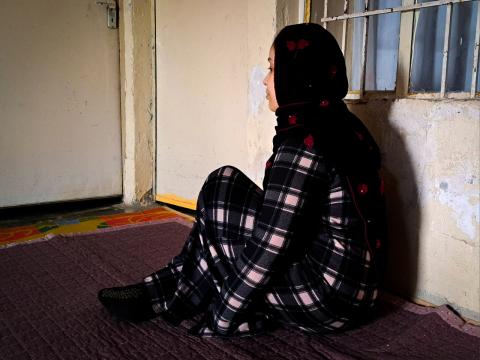Hadeel* feels happy that her privacy is respected

Hadeel* was born 19 years ago. However, the moment of happiness did not last long for her single mother Fadia*. Soon after her birth, the doctor told Fadia that there was a hole in her back. The doctor told Fadia that Hadeel had to undergo a surgery to be able to walk in the future. The operation was not successful and she became partially paralyzed from her waist to toes. Fadia was in despair and was worried about the future hold of her little child. Fadia recalls that moment very well, “I felt that I carried the heaviness of a mountain.”
Today Hadeel is a teenager and lives in the heart of Kirkuk with her mother since her birth. Hadeel has a very strong tie with her Fadia. Her father separated from her mother before her birth. She also has two elder siblings who are now married and are living on their own.
Fadia supports her daughter by encouraging her to be resistant and strong to be able to overcome all life challenges.
Hadeel, hearing words of encouragement frequently and feeling her mother’s support, accepted her paralysis over time yet still feeling uncomfortable about it. Sometimes Hadeel would feel embarrassed of her situation when she would compare herself to other girls of her age who could walk and do things she would have difficulty to do.
Fadia would often take Hadeel to the center for persons living with disabilities and she would often show her that there are worse cases of disability than hers and that those people living with disabilities are still doing their best and are striving.
Hadeel was in the fifth grade of the primary school when she left it. School’s classrooms for students of the of fourth and upper grades were in the second floor. Hadeel endured a year of difficulty climbing the stairs to reach to her classroom. Fadia was helping her to reach her classroom so that she could continue her studies. But when she moved to the fifth grade, she no longer could manage and consequently had no other choice but to leave the school because of lack of accessibility.
Mother and daughter need a source of income to survive, and are forced to give some space of their home for a rent to a person who runs a men’s hair salon. Through this rented space, Hadeel and her mother gain a small income and make a living.
Before, Hadeel had to struggle to go to the bathroom. “I had a difficulty reaching the bathroom. They [World Vision Iraq and Rozh Society] made a bathroom just for my needs. They made an internal bathroom and it is nice. Before I needed to access the bathroom through the living room. When we used to have visitors, I had to crawl in front of them to go to the bathroom. But now I can access the toilet through my bedroom, and it is isolated,” explained Hadeel.
Inside the house, she crawls on her feet, but when she goes out of the home she uses a wheelchair. “My dream is to recover and cure from this disability,” said Hadeel.
Through "Strengthening Gender Equality and Social Inclusion in the sector of Water, Sanitation and Hygiene for Iraqi women and persons living with disabilities in Kirkuk Governorate" Project, World Vision Iraq and its partner Rozh Society rehabilitated Water Sanitation and Hygiene (WASH) facilities in sixty homes of persons living with disabilities and assured that thirteen public facilities - such as schools, health centers, and government offices - are accessible for persons living with disabilities. The project is funded by World Vision Taiwan and World Vision US and is implemented in Kirkuk and Hawiga.